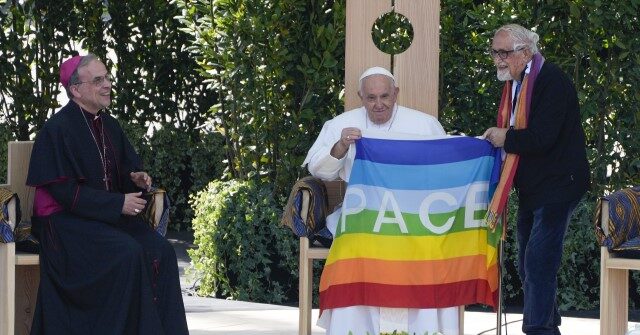Recently, Pope Francis has named 21 new cardinals who are set to be elevated during a consistory on December 8. Among them, a notable pro-LGBT group, New Ways Ministry, has expressed enthusiasm over several candidates they describe as “LGBTQ-positive.” Robert Shine, the managing editor of New Ways Ministry, highlighted that many of the new cardinals have welcoming records concerning LGBTQ+ issues, indicating a significant shift within the Church’s hierarchy. The selection has drawn attention for potentially embracing progressive stances regarding LGBTQ+ matters, marking a notable departure from more traditional Catholic teachings.
Leading the charge is Father Timothy Radcliffe, a well-known advocate for LGBTQ+ rights and a Dominican friar. He has a history of encouraging Catholics to support and engage with homosexual individuals, famously suggesting that they screen movies like “Brokeback Mountain” and read books by gay authors. His long-standing commitment to LGBTQ+ advocacy places him at the forefront of contemporary discussions within the Church about inclusivity and acceptance, though not without controversy. Critics argue that his views contradict traditional Catholic teachings, further complicating the conversation around the Church’s stance on homosexuality.
Another new cardinal, Bishop Pablo Virgilio David of Kalookan, Philippines, has publicly backed legislation aimed at protecting individuals based on their gender identity and sexual orientation. He characterizes this support as a “Christian imperative,” emphasizing a moral obligation to advocate for the rights of LGBTQ+ individuals. Such endorsements reflect a broader trend among some Church leaders to align themselves with secular movements seeking equality and justice for marginalized communities, though it raises issues regarding fidelity to established Church doctrine, particularly concerning sexual ethics.
In addition to Radcliffe and David, the appointment of Archbishop Tarcisio Isao Kikuchi of Tokyo contributes to this narrative of a progressive shift within the Church. Kikuchi has contributed to works exploring the intersection of LGBT and Christianity, further indicating his support for LGBTQ+ issues. His archdiocese’s engagement with LGBT Catholic Japan, including its organization of monthly Masses for the community, demonstrates an active consideration of LGBTQ+ matters within faith contexts, raising further questions about how such recognition aligns or conflicts with traditional Catholic teachings.
Historically, the Vatican’s Congregation for the Doctrine of the Faith (CDF) has taken a standoffish position toward groups like New Ways Ministry. In 1999, the CDF permanently barred its founders from serving in any pastoral roles concerning homosexual persons due to perceived misalignments with Church teaching. The CDF asserted that the group’s representations of homosexuality fail to convey the Church’s consistent stance on the intrinsic evil of homosexual acts and the disorder of homosexual inclination, underscoring tensions between more traditionalist perspectives and the evolving views espoused by some within the Church hierarchy today.
Despite the progressive sentiments emanating from these new appointments, U.S. bishops have taken a firm stand against New Ways Ministry’s claims to represent Catholic teachings. Cardinal Francis George, former president of the U.S. Bishops’ Conference, explicitly stated that the organization has historically contradicted the Church’s position on homosexuality. He cautioned that their claims to be representative of Catholic principles mislead the faithful, underscoring the significant divide between the new cardinals’ approaches and the standing authority of the Church’s teachings. As cardinals are expected to elect the next pope upon Francis’s eventual passing, their potential influence on the direction of the Church’s social teachings concerning LGBTQ+ issues remains a topic of vital interest and ongoing debate within and beyond the Catholic community.

